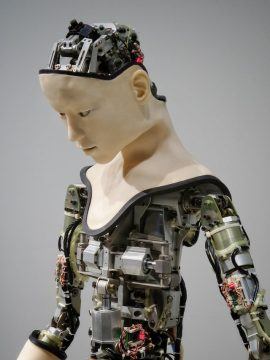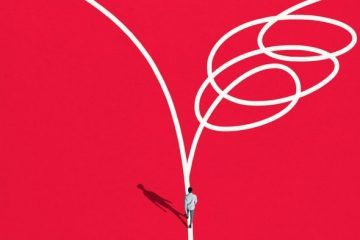This photo reminded me of Georges Seurat’s “A Sunday Afternoon on the Island of La Grande Jatte” (see image in first comment) and appropriately, it was taken yesterday (Sunday) afternoon at the Lido in Brixen, South Tyrol.
Month: October 2020
Film Review: ‘David Byrne’s American Utopia’ Is a Much-Needed Antidote
by Alexander C. Kafka
David Byrne’s artistry has always had a living-room intimacy, reflected in the delightful cover photos of the 1982 double-live album The Name of This Band Is the Talking Heads. In the midst of a pandemic, inviting him into our space — or being invited into his — is exactly the therapy the world needs.
American Utopia is Spike Lee’s film of Byrne’s 2019 Broadway show, which was itself derived from a concert tour off his 2018 album. That included 10 tracks lasting shy of 40 minutes. The Broadway show has 21 tracks at 90 minutes, wrapping in decades of hits and lesser-known tunes from Talking Heads and solo projects.
The work is political without stridency, with Byrne celebrating the cast’s immigrant origins, urging the audience to vote, and pulling in “Hell You Talmbout,” Janelle Monae’s protest song against racist and police violence. Like the upside-down poster lettering of the word “Utopia,” the production is tensely, tentatively optimistic — the implicit message being that America remains deeply, spasmodically screwed up, but that its better nature, its innocence, still pulses.
Byrne begins Spalding Gray-ishly, sitting behind a desk and holding the model of a brain. He explains that we lose cerebral synapses after infancy and wonders whether we just plateau into stupidity or if the connections that start within us extend outward between us. For an artist who has speculated that he is on the mild end of the autism spectrum, this preoccupation with connection has both personal and ideological resonance. Read more »
When is My Choice My Own? A Reflection on the Impact of Persuasion and Big Data
by Robyn Repko Waller
Whether a data-driven nudge diminishes my agency turns on more than just its algorithmic origin.

With the US Presidential Election and other national contests a mere weeks away, voter persuasion efforts of all stripes are at a peak. While traditional methods of pressing the flesh (but not too literally these days — COVID and all) and handwritten postcard appeals abound, bespoke data-driven means of reaching voters have surged. And although some platforms have banned political advertising since the Cambridge Analytica scandal, not all have.
The targeted ads aren’t restricted to politics, of course. Our social media feeds are cultivated to show the best balance and order of posts for us as individuals, those of our connections peppered with well-placed content to pique our clicking interests and keep us scrolling, all to increase platform profits. Meanwhile your watch has reminded you to stand up. But, it’s not all bad, you say. Sure I may have wasted a regrettable amount of time checking out house renovation reveals. But I also found those cute burgundy Oxford shoes and that algorithm-promoted post by a friend on algorithmic bias was deliciously ironically useful.
So when does influence undermine my choice? What makes some choices my own and other choices problematically of outside origination? Read more »
When Words Fail
by Dwight Furrow
 What did the wines that stimulated conversation in Plato’s Symposium taste like? Or the clam chowder in Moby Dick, or the “brown and yellow meats” served to Mr. Banks in To the Lighthouse? Or consider this repast from Joyce’s Ulysses:
What did the wines that stimulated conversation in Plato’s Symposium taste like? Or the clam chowder in Moby Dick, or the “brown and yellow meats” served to Mr. Banks in To the Lighthouse? Or consider this repast from Joyce’s Ulysses:
Mr. Leopold Bloom ate with relish the inner organs of beasts and fowls. He liked thick giblet soup, nutty gizzards, a stuffed roast heart, liverslices fried with crustcrumbs, fried hencods’ roes. Most of all he liked grilled mutton kidneys which gave to his palate a fine tang of faintly scented urine.
Lovely.
But we shall never understand the peculiar attractions of this food, because sensibility is a matter of habit and habits are seldom articulated clearly. They are so familiar we don’t bother to reflect on them or explain them. But even if Bloom had engaged in “mindful eating,” I doubt that Joyce, despite his prodigious talents, had the vocabulary to capture in words the virtues of grilled mutton kidneys with the “tang of faintly scented urine.” We are just not very good at talking about taste. The history of sensibility cannot be written. Read more »
E. B. White’s “Plain Style” @75
Jan Mieszkowski at Public Books:
 “No one,” declared James Thurber, “can write a sentence like E. B. White.” Throughout his six-decade career, White was widely celebrated for his mastery of “the plain style.” His columns and anecdotes for the New Yorker, his longer essays, and his immensely popular trio of children’s books (Charlotte’s Web, Stuart Little, The Trumpet of the Swan) were invariably praised for their clarity and unadorned directness, not to mention their pithy gestures of tasteful irreverence.
“No one,” declared James Thurber, “can write a sentence like E. B. White.” Throughout his six-decade career, White was widely celebrated for his mastery of “the plain style.” His columns and anecdotes for the New Yorker, his longer essays, and his immensely popular trio of children’s books (Charlotte’s Web, Stuart Little, The Trumpet of the Swan) were invariably praised for their clarity and unadorned directness, not to mention their pithy gestures of tasteful irreverence.
In addition to being an acclaimed essayist and children’s author, White had the curious fate to have written the book on how to write, or at least part of it, when he updated and expanded a pamphlet his former teacher William Strunk Jr. had created for his students at Cornell. The result was the most successful composition guide of all time. The Elements of Style—“Strunk and White”—has sold more than 10 million copies and is still a staple of higher-education syllabuses, although it is assigned far more often than it is read.
It might seem self-evident that White the author practiced what Strunk and White the style gurus preached, but the truth is more complicated.
More here.
As Wildfires Burn, Assigning Blame Is Complicated
Eve Driver in Undark:
 WHILE FOR DECADES there has been scientific consensus that the climate is changing, only in the past few years has it become possible for scientists to link that change to particular weather events. Even as it advances, however, attribution science, also called probabilistic extreme event attribution, has uncertainties built into it. Broadly speaking, it’s done by comparing two computer models — one that reflects the world as it is, and another that reflects the world as it would have been without global warming — to determine whether the probability of a weather event was affected by climate change and, if so, by how much.
WHILE FOR DECADES there has been scientific consensus that the climate is changing, only in the past few years has it become possible for scientists to link that change to particular weather events. Even as it advances, however, attribution science, also called probabilistic extreme event attribution, has uncertainties built into it. Broadly speaking, it’s done by comparing two computer models — one that reflects the world as it is, and another that reflects the world as it would have been without global warming — to determine whether the probability of a weather event was affected by climate change and, if so, by how much.
But the results come with caveats. For instance, attribution science doesn’t determine whether climate change made an event possible, but rather if it made the event more likely. The method is also difficult to apply in locales that have little historical data on weather patterns. And certain kinds of events — hurricanes and droughts, for instance — are harder to model than others. Hard evidence of climate change’s influence on Hurricane Sandy, which battered the northeastern U.S. in 2012, didn’t come until years after the fact.
But for wildfires like the ones currently burning in the West, the links with climate change are relatively easy to model and affirm.
More here.
Wildlife photographer of the year 2020 winners

More, from The Guardian, here.
Is Machiavelli good, then, or is he evil?
Tim Parks in the New York Review of Books:

“Is Machiavelli good, then, or is he evil?” asks the French scholar Patrick Boucheron in his discussion of The Prince, a book whose “whole program is to uncouple political action from conventional morality.” Is he advising political leaders to be treacherous, violent, and dishonest (as Diderot believed), or revealing to ordinary people the mechanisms behind their leaders’ dishonesty, violence, and treachery (as Rousseau believed)? “We would like to have an answer,” Boucheron writes, but the matter is better “set aside.” Machiavelli was simply saying “the truth about things.” Still, the question hangs in the air, if only because Boucheron’s anxiety over the deteriorating morality of politics today has him turning to the Italian for guidance.
More here.
Ruth Falcon (1942 – 2020)
Sunday Poem
i sing of Olaf glad and big
i sing of Olaf glad and big
whose warmest heart recoiled at war:
a conscientious object-or
his wellbelovéd colonel (trig
westpointer most succinctly bred)
took erring Olaf soon in hand;
but–though an host of overjoyed
noncoms (first knocking on the head
him) do through icy waters roll
that helplessness which others stroke
with brushes recently employed
anent this muddy toiletbowl,
while kindred intellects evoke
allegiance per blunt instruments–
Olaf (being to all intents
a corpse and wanting any rag
upon what God unto him gave)
responds, without getting annoyed
“I will not kiss your fucking flag”
straightway the silver bird looked grave
(departing hurriedly to shave)
but–though all kinds of officers
(a yearning nation’s blueeyed pride)
their passive prey did kick and curse
until for wear their clarion
voices and boots were much the worse,
and egged the firstclassprivates on
his rectum wickedly to tease
by means of skilfully applied
bayonets roasted hot with heat–
Olaf (upon what were once knees)
does almost ceaselessly repeat
“there is some shit I will not eat”
our president, being of which
assertions duly notified
threw the yellowsonofabitch
into a dungeon, where he died
Christ (of His mercy infinite)
i pray to see; and Olaf, too
preponderatingly because
unless statistics lie he was
more brave than me:more blond than you.
by E. E. Cummings
from The Complete Poems: 1904-1962
Liveright Publishing Corporation
The $16-Trillion Virus
Jonathan Shaw in Harvard Magazine:
 THE FINAL TALLY OF ECONOMIC DAMAGE caused by SARS-CoV-2 will have to wait for the pandemic’s end, but in the meantime, two eminent economists have estimated the cost in the United States alone at $16 trillion. Eckstein professor of applied economics David Cutler, an expert on health care, and Eliot University Professor and president emeritus Lawrence H. Summers, former U.S. Secretary of the Treasury, lay out the grim prognosis in a Journal of the American Medical Association article: “The SARS-CoV-2 (severe acute respiratory syndrome coronavirus 2) pandemic,” they write in a Viewpoint, “is the greatest threat to prosperity and well-being the U.S. has encountered since the Great Depression.”
THE FINAL TALLY OF ECONOMIC DAMAGE caused by SARS-CoV-2 will have to wait for the pandemic’s end, but in the meantime, two eminent economists have estimated the cost in the United States alone at $16 trillion. Eckstein professor of applied economics David Cutler, an expert on health care, and Eliot University Professor and president emeritus Lawrence H. Summers, former U.S. Secretary of the Treasury, lay out the grim prognosis in a Journal of the American Medical Association article: “The SARS-CoV-2 (severe acute respiratory syndrome coronavirus 2) pandemic,” they write in a Viewpoint, “is the greatest threat to prosperity and well-being the U.S. has encountered since the Great Depression.”
The costs through the fall of 2021, assuming the pandemic is largely controlled by then, break down as follows:
- $7.6 trillion in lost economic output, according to estimates by the Congressional Budget Office;
- $4.4 trillion in losses due to premature deaths (assuming a relatively conservative statistical value of $7 million is placed on each life lost, and that current trajectories continue, which would lead to 625,000 cumulative deaths associated with the pandemic through next year in the United States);
- $2.6 trillion in health-care costs associated with long-term complications among survivors;
- $1.6 trillion in increased mental-health costs attributable to the pandemic if the mental-health effects last just a year.
Cutler and Summers point out that their total, $16.2 trillion, is approximately 90 percent of the annual GDP of the United States, and far exceeds the costs associated with conventional recessions in this country.
More here.
We Learn Faster When We Aren’t Told What Choices to Make
Michele Solis in Scientific American:
 In a perfect world, we would learn from success and failure alike. Both hold instructive lessons and provide needed reality checks that may safeguard our decisions from bad information or biased advice. But, alas, our brain doesn’t work this way. Unlike an impartial outcome-weighing machine an engineer might design, it learns more from some experiences than others. A few of these biases may already sound familiar: A positivity bias causes us to weigh rewards more heavily than punishments. And a confirmation bias makes us take to heart outcomes that confirm what we thought was true to begin with but discount those that show we were wrong. A new study, however, peels away these biases to find a role for choice at their core. A bias related to the choices we make explains all the others, says Stefano Palminteri of the French National Institute for Health and Medical Research (INSERM), who conducted a study published in Nature Human Behaviour in August that examines this tendency. “In a sense we have been perfecting our understanding of this bias,” he says.
In a perfect world, we would learn from success and failure alike. Both hold instructive lessons and provide needed reality checks that may safeguard our decisions from bad information or biased advice. But, alas, our brain doesn’t work this way. Unlike an impartial outcome-weighing machine an engineer might design, it learns more from some experiences than others. A few of these biases may already sound familiar: A positivity bias causes us to weigh rewards more heavily than punishments. And a confirmation bias makes us take to heart outcomes that confirm what we thought was true to begin with but discount those that show we were wrong. A new study, however, peels away these biases to find a role for choice at their core. A bias related to the choices we make explains all the others, says Stefano Palminteri of the French National Institute for Health and Medical Research (INSERM), who conducted a study published in Nature Human Behaviour in August that examines this tendency. “In a sense we have been perfecting our understanding of this bias,” he says.
…Delusions can be a hallmark of psychosis, in which they may involve extreme beliefs about alien abduction or being a god. Milder delusionlike thinking also touches otherwise healthy people, such as a sports fan with a superstition about wearing a lucky shirt to ensure a team’s win. More harmfully, the current coronavirus pandemic has wrought some delusions of its own, such as one that holds that mask wearing causes sickness.
So a false belief remains fixed, and any outcomes that contradict it are not accepted by the brain. If choice is the point of reference that governs our learning style (with or without confirmation bias), then maybe something about choice or an inflated sense of control pushes people toward delusions. Perhaps individuals with delusions are choosing to have particular experiences to support a false belief and choosing to interpret information in a way that supports that belief.
More here.
Erin Wall (1975 – 2020)
Rhonda Fleming (1923 – 2020)
The Presidential Town Halls Were Mister Rogers Versus Nasty Uncle Trump
Susan Glasser in The New Yorker:
 Even Donald Trump has moments of self-awareness. During an interview last week with Rush Limbaugh, the right-wing talk-radio host whom he honored with the Medal of Freedom earlier this year, the President briefly abandoned his puffery to admit that he might be defeated—and that his own nastiness would be the reason why. “Maybe I’ll lose,” he told Limbaugh, “because they’ll say I’m not a nice person.” He added, “I think I am a nice person,” before pivoting back to his trademark name-calling. A few days later, the political liability of his brutish persona was clearly on Trump’s mind again. “Can I ask you to do me a favor?” he begged “suburban women” at a rally in Johnstown, Pennsylvania, on Monday. “Will you please like me, please, please?”
Even Donald Trump has moments of self-awareness. During an interview last week with Rush Limbaugh, the right-wing talk-radio host whom he honored with the Medal of Freedom earlier this year, the President briefly abandoned his puffery to admit that he might be defeated—and that his own nastiness would be the reason why. “Maybe I’ll lose,” he told Limbaugh, “because they’ll say I’m not a nice person.” He added, “I think I am a nice person,” before pivoting back to his trademark name-calling. A few days later, the political liability of his brutish persona was clearly on Trump’s mind again. “Can I ask you to do me a favor?” he begged “suburban women” at a rally in Johnstown, Pennsylvania, on Monday. “Will you please like me, please, please?”
I do not know who will win the election less than three weeks from now. But I do know this: if Trump does lose, he’s right that his sheer unlikability will be a major contributing factor. He’s a bully and a boor. He’s overbearing, self-absorbed, impossible to shut up, and especially patronizing to women, which, of course, is one of the reasons why those suburban moms he is begging to vote for him are telling pollsters that they are decidedly against him.
More here.
National Populism in Power: the Consequences for Fundamental Rights
 Jordi Vaquer in Idees:
Jordi Vaquer in Idees:
The world currently finds itself immersed in the so-called “third wave” of authoritarianism. Since the start of the twenty-first century, and especially over the last five years, more and more countries have been losing the characteristics of a democracy and becoming hybrid — Hybrid regimes combine characteristics of both democratic and authoritarian regimes. The term has been used to define a range of governments, including the electoral autocracies of the 1960s and 1970s (such as those in Mexico, Singapore, Senegal and Taiwan) and the so-called “illiberal democracies” of today. See L. Diamond (2002), “Elections Without Democracy: Thinking About Hybrid Regimes” in Journal of Democracy 13-2, pages 21-35. or openly autocratic regimes. For the first time since 2001, there are more autocracies (specifically, 92 countries, which together are home to 54% of the world’s population) than democracies, while 35% of the world’s population lives in countries governed by increasingly authoritarian regimes — AV ‘Autocratization Surges, Resistance Grows’ in Democracy Report 2020, VDem Institute, University of Gothenburg, March 2020.. The positive progress made in countries such as the Gambia, Ethiopia, Sudan, Armenia and Malaysia are exceptions within a global framework that is less and less favourable to liberal democracies with each day that passes.
The traditional means by which authoritarian regimes are installed, such as coups d’état and civil conflict, have played an important role in this new wave of authoritarianism (Thailand and Egypt are both excellent examples). However, the chief characteristic of this new political development is that the primary vector of authoritarianism is elected governments, which despite their clear disdain for the mechanisms that serve to control and balance power, still manage to gain and retain popular support in competitive elections. Moreover, they are doing so, and herein lies the great novelty — In the 1990s and 2000s, hybrid regimes were usually the result of incomplete transitions toward democracy and were mostly more open than the dictatorships that had preceded them. See T. Carothers (2002), “The End of the Transition Paradigm” in Journal of Democracy 13-1, pages 1-21., in countries with a relatively consolidated democratic history and a tradition of pluralism.
More here.
Automation and the Future of Work
Learn the Language of Power by Ha-Joon Chang
Where loneliness can lead
 Samantha Rose Hill in Aeon:
Samantha Rose Hill in Aeon:
What prepares men for totalitarian domination in the non-totalitarian world is the fact that loneliness, once a borderline experience usually suffered in certain marginal social conditions like old age, has become an everyday experience …
– From The Origins of Totalitarianism (1951) by Hannah Arendt
‘Please write regularly, or otherwise I am going to die out here.’ Hannah Arendt didn’t usually begin letters to her husband this way, but in the spring of 1955 she found herself alone in a ‘wilderness’. After the publication of The Origins of Totalitarianism, she was invited to be a visiting lecturer at the University of California, Berkeley. She didn’t like the intellectual atmosphere. Her colleagues lacked a sense of humour, and the cloud of McCarthyism hung over social life. She was told there would be 30 students in her undergraduate classes: there were 120, in each. She hated being on stage lecturing every day: ‘I simply can’t be exposed to the public five times a week – in other words, never get out of the public eye. I feel as if I have to go around looking for myself.’ The one oasis she found was in a dockworker-turned-philosopher from San Francisco, Eric Hoffer – but she wasn’t sure about him either: she told her friend Karl Jaspers that Hoffer was ‘the best thing this country has to offer’; she told her husband Heinrich Blücher that Hoffer was ‘very charming, but not bright’.
Arendt was no stranger to bouts of loneliness. From an early age, she had a keen sense that she was different, an outsider, a pariah, and often preferred to be on her own. Her father died of syphilis when she was seven; she faked all manner of illnesses to avoid going to school as a child so she could stay at home; her first husband left her in Berlin after the burning of the Reichstag; she was stateless for nearly 20 years. But, as Arendt knew, loneliness is a part of the human condition. Everybody feels lonely from time to time.
More here.

